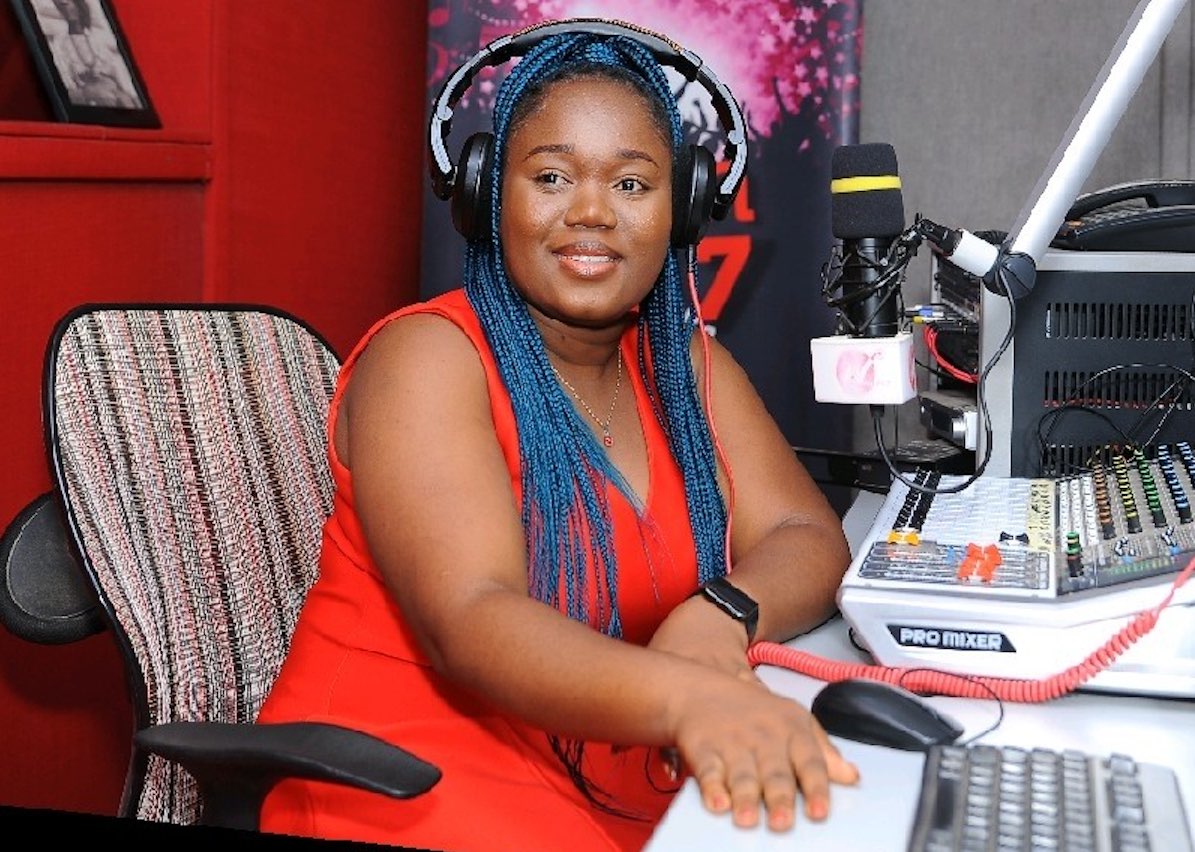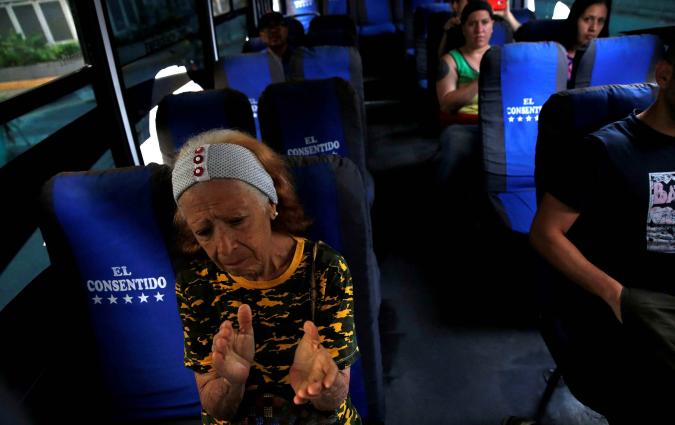A radio station amplifying the voices of Nigerian women

Women Radio's Head of Programmes, Esther Alaribe.
Women Radio WFM 91.7 hit the airwaves in Nigeria in November 2015 as a platform committed to amplifying the voices of women.
Before its launch, the country’s first all-women radio station conducted research to identify gaps in coverage and representation. Only 17% of existing radio shows at the time were targeted at women and most women didn’t like those already on air. Many found their content “prejudiced, one-sided and non representative.” This is what Women Radio WFM 91.7 wanted to change.
“We noticed that we did not have a lot of women representation in the media,” says Esther Alaribe, the station’s head of programmes. “It’s almost as if women are an afterthought when it comes to talking about women’s issues. So we want to do something different by being devoted to women and ensuring that we keep women issues at the front.”
Amplifying women voices
The station’s programmes highlight issues from the women's angle and cut across general beats including education, relationships, politics, business, sports, music, news, current affairs and entertainment.
Nigeria is a “patriarchal society”, Alaribe says, where people assume that only men facilitate developments. Even on air, it is common to see men analyse and talk about women issues without a woman to provide insight during a programme. “Over the years people unconsciously have put women in a box and they think this is where they can only be,” she says.
Alaribe’s radio station is changing this narrative through daily female-centric programmes and advocacy. “We just told ourselves that Women Radio would be that platform where every woman feels safe,” she says.
One of their programmes examined the risk factors and treatment for uterine fibroids. Another programme looked at what women should know before they get pregnant. It featured a medical expert who explained the issues surrounding pregnancy. Commemorating International Day of the Girl-Child, the station also looked at how young girls can be supported and empowered for leadership roles.
Alaribe explains that the aim of airing female-centric programmes is “to ensure that we amplify the voices of women and ensure women are able to maximise their own potentials and contribute to national development.”
Training journalists
The station recently launched the Women Radio Centre, a place to train female journalists and empower them to cover women issues in Nigeria. The centre has hosted several training sessions so far. The second cohort of its female investigative reporting training included 20 female journalists from across Nigeria’s six geopolitical zones. The women were trained by media experts in investigative journalism, fact-checking, data journalism, and safety in the field.
Angela Nkwo-Akpolu is one of the female journalists trained in April this year. Although she mostly covers politics and governance for the Leadership Newspaper, a media outlet in Nigeria, Nkwo-Akpolu says the training exposed her to other aspects of journalism. “It was a huge breath of fresh air,” she said, adding that other courses are “not as intense as the [training] women radio provided.”
One major aspect of the programme was guiding participants on how to tell compelling stories through a gender lens, which is in line with the mission of Women Radio.
“The beauty about this programme was that it was strictly from a gender lens. For me, that was huge. Learning to tell women’s stories especially in our climate, where women would rather prefer to suffer the effect of whatever they were going through is important,” Nkwo-Akpolu says.
After the three-day training, Nkwo-Akpolu investigated the effect of the weekly sit-at-home order on women in the country’s south-east region. In August 2021, the Indigenous Peoples of Biafra (IPOB) – a group agitating for Igbo secession – began the enforcement of the weekly sit-at-home order mainly to deepen its support base and push for the release of its leader, Nnamdi Kanu, who is in the custody of the Department of State Services (DSS).
The enforcement has since taken a deadly turn, leading to the loss of lives, properties, and livelihoods. Nkwo-Akpolu says that telling the story of these women was important for her as it exposed her to their suffering.
Blessing Oladunjoye was one of the 20 women who participated in a week-long investigative journalism training hosted by the centre in August 2022. Oladunjoye is a journalist and publisher at BONews Service, an online development news platform that focuses on women, persons with disabilities and children.
“It was intensive,” Oladunjoye said about the training. “I learnt a lot because it covered the rudiments of investigative journalism.”
After the training, the centre supported participants with tools to produce stories. Oladunjoye received a spy camera which supported her undercover investigation on the illegitimate practices and the absence of substantial law on surrogacy in Nigeria. With this story, Oladunjoye emerged as the overall winner of the 2023 Female Reporters Leadership Programme of the Wole Soyinka Centre for Investigative Journalism in September.
So far, the centre has trained 135 Nigerian journalists, including training of 75 political reporters in positive portrayal of women in seven states and 20 women executives.
Going into podcasts
Women Wadio is also embracing podcasting to tell stories. So far it has produced over 100 episodes in English, Pidgin, Yoruba and Hausa. One of its podcasts examined the employment discrimination of women in Nigeria.
The station often encourages active participation, especially through phone-in call programmes where women share insights to issues discussed. “We are beginning to see change now in a way that women are now being comfortable to talk about their own issues,” Alaribe says. The station’s workforce is 85% women.
“We have a platform where women can tell their stories undiluted and we join our voices with women groups or organisations to demand adequate representation, adequate policy and implementation that concern women and girls,” Alaribe says.
External support
Women Radio was among the 10 additional media organisations selected to participate in Nigeria Media Innovation Program (NAMIP), a three-year initiative working to support the editorial independence of media organisations in Nigeria by strengthening their financial sustainability.
Although the outlet is a commercial station which mostly relies on advertisements for sustenance, it has implemented projects with support from partners like ActionAid Nigeria, UN Women, the Nigerian Women Trust Fund, NAMIP and MacArthur Foundation.
Alaribe says they have partnered with other media organisations. “We have asked them to give visibility to the cause of women and feature them in programmes,” she says.
A major challenge facing the station is that some of the public still assumes the station’s mission is to promote feminism. Alaribe often tries to correct this assumption and explains Women Radio “is not just for women but for women and their families.”
Back in 2017, and as part of its effort to empower women and keep them financially independent, Women Radio launched EquipHer to provide entrepreneurial training for 200 females every year in shoemaking, jewellery making, hair making, cake baking, and interior decoration.
“If you empower a woman, she will go back to her home and contribute effectively. At the end of the day, it’s for the good of the family, the society and the nation at large,” Alaribe says “We are family-oriented. We know that whatever investment you make in a girl or in a woman will cascade to society.”
One of the station’s ambitious plans, says Alaribe, is to establish a Women Radio station in each of Nigeria’s 36 states. This would serve as a platform, she says, where every woman can freely discuss issues that affect them.
“We want to get to the point where we have a woman radio in almost every state in the country,” Alaribe says. “This is not just for the sake of our organisation, but to create media spaces where women feel comfortable talking about their stories.”
In every email we send you'll find original reporting, evidence-based insights, online seminars and readings curated from 100s of sources - all in 5 minutes.
- Twice a week
- More than 20,000 people receive it
- Unsubscribe any time
signup block
In every email we send you'll find original reporting, evidence-based insights, online seminars and readings curated from 100s of sources - all in 5 minutes.
- Twice a week
- More than 20,000 people receive it
- Unsubscribe any time







